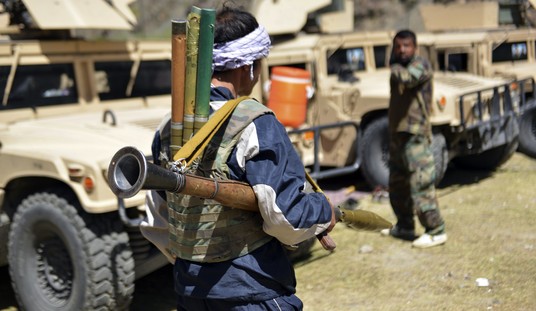CNBC published a story Saturday noting that Venezuelan hyperinflation has hit a new milestone. The story argues that reversing the damage done to the economy will require “shock therapy” which could take as much as a decade to reverse the country’s current course:
Venezuela’s hyperinflation rate increased from 9,029 percent to 10 million percent since 2018, according to the International Monetary Fund, though it is expected to decline to back below 1 million percent due to recent moves by the country’s central bank, according to a recent IMF forecast.
But the economic situation remains dire: The IMF says the cumulative decline of the Venezuelan economy since 2013 will reach 65% this year — for 2019 the annual decline forecast has increased from 25% to 35%. The five-year contraction is one of the worst in the world over the past half century and one of the few that was not caused by armed conflicts or natural disasters, the IMF stated earlier this week…
Shock therapy supports the implementation of drastic economic policies to combat hyperinflation, shortages, reduce the budget deficit — Venezuela’s current budget deficit stands at –29.95% in relation to GDP — and transition from a state-controlled economy to a mixed one…
Shock therapy measures, based on recent economic history, can include ending price controls and government subsidies, instituting higher tax rates and lower government spending to reduce budget deficits, devaluing the currency to boost foreign investments and selling state-owned industries to the private sector.
In other words, the country needs to stop being a socialist economy and start acting more like a free market. That would include privatizing industry and welcoming foreign investment to attempt to create a broader economy that isn’t entirely dependent on the sale of oil. The problem is that in the past few years, millions of white-collar people have fled the country and aren’t likely to come back.
Venezuela has lost more than 10% of its population in recent years. The number of Venezuelan migrants and refugees has reached 4 million and is expected to surpass 5.3 million by the end of this year, according to the UN Refugee Agency.
Many of those who have fled will most likely not return. They are making their living elsewhere; their children are attending college and are finally comfortable after starting from zero in a foreign land. The idea of leaving everything behind to return to Venezuela and help rebuild the country might not be appealing.
And why would you risk returning to a country that took everything from you in the name of socialism? That especially the case when the regional socialists and communists are still holding meetings to discuss the future of their cause as if the past two years hadn’t happened:
The Sao Paulo Forum (SPF) that took place in Caracas just ended on July 28 fittingly within the framework of remembering the 65th anniversary of the birth of Hugo Chavez with a display of affection and respect for the late Comandante with fireworks and all…
Since Hugo Chavez became president of Venezuela in 1999, Latin America and the Caribbean have made huge social advances to the point that the US administration “took notice” and proceeded to attack every advance perceived to be contrary to the interests of its imperial hegemony. By its own declaration the US government has targeted Venezuela, Cuba and Nicaragua for regime change.
With this backdrop, the SPF declaration, unequivocally titled “Unity of the peoples against imperialism”, recognizes that “the multifaceted reactionary offensive of US imperialism and the oligarchic rightwing allies has been deepened.” Therefore, “it is urgent to resume the [progressive] initiative more vigorously and effectively.” It further asserts, “Before the disintegrating plan of the right, let us counter with the integrating, sovereign and dignified plan of our peoples.
Even now, with people starving and without medicine, there are socialists braying on about the greatness of Hugo Chavez and the evil of US imperialism. There was a blackout as this forum was taking place and the author blames that on right-wing saboteurs as well. That’s actually in keeping with the Maduro regime which has blamed blackouts on an “electromagnetic attack” by unspecified enemies. That was the most recent blackout. The previous nationwide blackout which took place in March was blamed on a US sniper. In reality, the blackout was likely caused by a fire resulting from lack of proper maintenance:
Before the discovery of the world’s largest oil reserves, Venezuela established a national grid built on hydroelectric and thermoelectric power. Today, the Guri dam hydroelectric plant in eastern Venezuela supplies about 80% of the country’s electricity.
Experts believe that failure to properly manage the electricity grid may have caused a fire that destroyed one of the huge lines that transport power from the Guri dam to Caracas.
According to Rodrigo Linares, a mechanical engineer and writer for the Caracas Chronicles website, the fault occurred on one of the main power lines between the San Gerónimo B and Malena substations. When that 765-kilovolt line went down, two others suffered an overload and also failed.
“That basically interrupted the electricity highway and stopped energy reaching consumers,” says Linares.
But in Venezuela today, nothing that goes wrong is the fault of the one-party socialist state running the country. Everything is blamed on someone else, usually the United States. It’s amazing to witness this level of self-deception in action, but this is what end-stage socialism looks like.








Join the conversation as a VIP Member